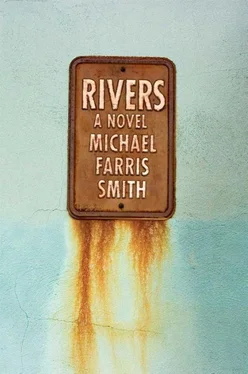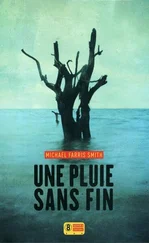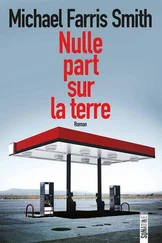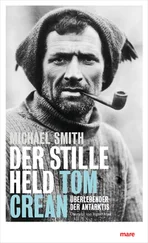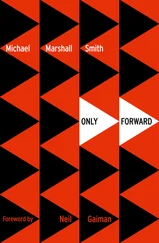The dog was in the backyard with Habana and he came over to them and said, “It could be the start of one long day. Longer than it has been. Thought I’d let you know. Especially you, girl.” He scratched at Habana’s ear. Thought of the day she had appeared across the field, wet and muddy and saddled but without a rider, her name engraved across the saddle. He thought of how he had approached her slowly, and she had let him, and he had checked her for cuts or scratches or the blood of whoever had been on her last. How she had helped him survive, taking him places the Jeep couldn’t go, into the swamplands that now extended by miles from the flooding rivers, where pieces of boats and the tin roofs of wooden shacks hung in the clutches of the gray monsterlike moss trees. Along the highways obstructed by trees and telephone poles and covered in lower stretches by still, tepid waters. Along the beachfront that had shrunk back and served as the dumping grounds for whatever the storms could drag in or haul away. Half-trailers and metal signs from flattened hotels and gas stations and dead animals. Poker tables and mattresses and steel pieces from crumbled oil rigs and a school bus. He thought of filling garbage bags with canned foods and paperback novels and blankets and batteries and gas cans and whatever else seemed necessary, how for weeks they had moved across the countryside until he felt like he had hoarded all there was to hoard.
And then he thought of how they were back in the same spot, starting all over again, and he hoped Habana knew how much he needed her.
He left the animals and walked inside, once more into the bedroom.
Closing his eyes, Cohen listened for their voices. The voices of the two people who had made a home here. In the house they had built. On the land that had been in his family for generations. The ocean so close. Everything seemingly where it was supposed to be. He listened for those voices. Tried to hear the laughter. Tried to hear what they were talking about as they stood together in the kitchen or sat in the living room with the windows open on a cool night. He couldn’t hear them, so he tried harder. Squeezing his eyes shut with his face tense as if fearful of some imaginary, invisible, yet very real monster.
Still he couldn’t hear them. He opened his eyes.
He walked to the window and looked out at the concrete slab. Looked at the pile of lumber. In the wildest part of his mind he thought that maybe one day, when all of this was over, he’d be able to come back and finish like he had promised.
He walked over to the nightstand and opened the drawer. He found a pencil and a piece of scrap paper and he wrote a note. At the doorway, he looked around the room once more, and then he felt in his back pocket to make sure he had the photograph and it was there. He stepped across the hallway and looked at the child’s clothes and toys and he said good night. And then he walked into the kitchen and left the note on the counter and he walked outside into the damp, chilling world where he picked up his pillowcase and climbed onto Habana and told the dog to come along. They moved lazily down the driveway to the gravel road. At the end of the driveway, Cohen turned Habana and he looked again at the house. He had said goodbye to them a thousand times, but this time felt the most real.
And then he nudged Habana and they moved on.
THEY ARRIVED HALF AN HOUR after Cohen rode away with habana and the dog.
The Jeep stopped on the carport slab and the four of them got out. Joe walked over to the generator and noticed the cut gas line and said, “Looks like your boy has been here. Damn cut the gas line. And took the spark plug.”
Aggie said grab it anyway and they each took an end and loaded it onto the trailer hitched on to the Jeep. The boy and the girl went inside and searched through what they had left on the first run, taking anything that might matter but mostly happy about the clothes. The girl went into the bedroom and she stood in front of the dresses, looking through them as if spending a leisurely day in a department store. The men came in and began taking the furniture out of the bedrooms and they called for the boy to help them. Piece by piece the nightstands and dressers and mattresses were taken out and loaded onto the trailer.
“I didn’t know there was nobody down here still living this good,” Aggie said as he carried out a set of bed rails.
“Me neither,” said Joe. “He ain’t no more, though. What you reckon he’s doing?”
“He might be sitting out there behind a tree somewhere with his sight on the back of your head.”
“Evan said they got all the guns. Didn’t you?”
“Think so.”
“Think? Better goddamn well know.”
“Don’t worry,” said Aggie. “If he was sitting behind a tree with something to shoot we’d be shot.”
They went back to work. Around the back of the house, Joe noticed the foundation and the wet, discolored pile of lumber. He called out to Aggie and Aggie came around.
“Looks like we got a winner for most ambitious resident,” Aggie said.
They kept on and soon the house was emptied and Evan called out to Mariposa to come on. She was lingering in the bedroom, had picked five dresses, and they were folded and stuck into her overcoat. She came out of the front door and said, “Go see if that horse is still back there.”
“That horse is long gone,” said Joe. “But there’s a cellar back around there, about two feet of water in it. Got some shelves, though. A bunch of saws and nail guns and stuff.”
“That’s gonna do a lot of good,” Aggie said. “Leave that stuff. We know where to find it if we change our minds.”
“All right,” Joe said. He turned to Mariposa. “You and Evan sit back there on top of the stuff to keep it from bouncing off.”
“I ain’t sitting back there,” she said.
He reached over and slapped her hard across the face and told her to shut her goddamn mouth and get back there. One of the dresses fell out of her coat and onto the ground and the man said, “Where the hell you think you going? To the ball, Cinderella?”
The two men laughed and Evan picked it up for her and looked to see if she was okay but she pushed him back and walked to the trailer and climbed up on top of the mattresses. Evan followed her and sat beside her and Mariposa glared at the two men. Aggie got behind the wheel and Joe said he was gonna walk through one more time. Inside, he passed through each room, checking for anything they had missed that might be of use or value, but the place had been stripped of its offering. In the kitchen he found a note on the counter that none of them had noticed. He picked it up and read. Didn’t laugh but smiled an uncomfortable smile. He folded the note and walked out and got in the passenger side of the Jeep.
“This is a good old place,” Aggie said as he settled behind the steering wheel. He cranked the Jeep and then Joe handed the note over to him.
“What’s that?”
“Looks like their friend left us a little note.”
The older man unfolded it, read it, then huffed and gave it back.
“What you think?”
Aggie paused. Pursed his lips and put the Jeep into first gear. “Don’t think nothing,” he said. “Too much of that’ll get you killed down here. You should know that by now.”
The gray of day was beginning to fade and thunder that had been far off now rumbled more closely and Aggie said the digging would have to wait until tomorrow. The Jeep moved off the concrete slab and out into the backyard and circled the house, the tires spinning some and the trailer tires sinking some but they made it around to the gravel and moved on, the girl and the boy vibrating with the furniture and generator like mindless wind-up toys. Aggie had shrugged off the note but Joe thought about it as he tucked it into his pocket. They moved along the skinny road and he looked out at the crippled trees and the twisted countryside and thought for the first time in a long time about his mother in her burgundy dress, his hand in hers as they walked through the front door of the little brick church on the dusty road. It seemed like the memory of some other woman and some other child and his thoughts drifted away from what he had become as he considered the mother and child and the tranquillity of the sanctuary. The cream-colored walls and cherrywood pews and slightly out-of-tune piano that played for the slightly out-of-tune choir composed of workingmen in short ties and old ladies with their glasses held around their necks by beaded silver chains. The rough voice of the preacher and the stories that he told about the man who walked from place to place. Touching them and healing them. Speaking to them of forgiveness and tolerance. Feeding them with crumbs and giving them all the chance to live in golden castles on golden streets in golden clouds.
Читать дальше
